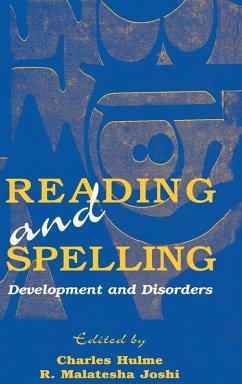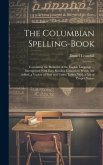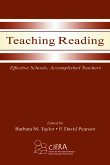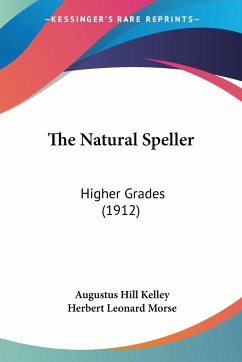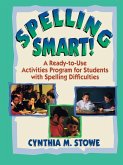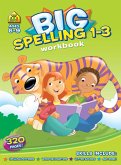Reading and Spelling
Development and Disorders
Herausgeber: Hulme, Charles; Joshi, R Malatesha
Reading and Spelling
Development and Disorders
Herausgeber: Hulme, Charles; Joshi, R Malatesha
- Gebundenes Buch
- Merkliste
- Auf die Merkliste
- Bewerten Bewerten
- Teilen
- Produkt teilen
- Produkterinnerung
- Produkterinnerung
In this volume leading researchers review what is currently known about both normal and impaired development of decoding, comprehension and spelling skills and discuss effective remedial strategies.
Andere Kunden interessierten sich auch für
![The Columbian Spelling-Book: Containing the Elements of the English Language ... Interspersed With Easy Reading Lessons; to Which Are Added, a Vari The Columbian Spelling-Book: Containing the Elements of the English Language ... Interspersed With Easy Reading Lessons; to Which Are Added, a Vari]() Daniel CrandallThe Columbian Spelling-Book: Containing the Elements of the English Language ... Interspersed With Easy Reading Lessons; to Which Are Added, a Vari35,99 €
Daniel CrandallThe Columbian Spelling-Book: Containing the Elements of the English Language ... Interspersed With Easy Reading Lessons; to Which Are Added, a Vari35,99 €![Teaching Reading Teaching Reading]() Teaching Reading190,99 €
Teaching Reading190,99 €![The Natural Speller The Natural Speller]() Augustus Hill KelleyThe Natural Speller23,99 €
Augustus Hill KelleyThe Natural Speller23,99 €![The Teaching of Spelling The Teaching of Spelling]() Willard Fred TidymanThe Teaching of Spelling35,99 €
Willard Fred TidymanThe Teaching of Spelling35,99 €![Spelling Smart! Spelling Smart!]() Cynthia M StoweSpelling Smart!33,99 €
Cynthia M StoweSpelling Smart!33,99 €![Big Spelling 1-3 for Reading Success (Ages 6-9) Big Spelling 1-3 for Reading Success (Ages 6-9)]() Om Books Editorial TeamBig Spelling 1-3 for Reading Success (Ages 6-9)79,99 €
Om Books Editorial TeamBig Spelling 1-3 for Reading Success (Ages 6-9)79,99 €![The Rational Spelling Book, Part 2 The Rational Spelling Book, Part 2]() Joseph Mayer RiceThe Rational Spelling Book, Part 234,99 €
Joseph Mayer RiceThe Rational Spelling Book, Part 234,99 €-
-
-
In this volume leading researchers review what is currently known about both normal and impaired development of decoding, comprehension and spelling skills and discuss effective remedial strategies.
Hinweis: Dieser Artikel kann nur an eine deutsche Lieferadresse ausgeliefert werden.
Hinweis: Dieser Artikel kann nur an eine deutsche Lieferadresse ausgeliefert werden.
Produktdetails
- Produktdetails
- Verlag: Taylor & Francis
- Seitenzahl: 512
- Erscheinungstermin: 1. Dezember 1997
- Englisch
- Abmessung: 229mm x 152mm x 29mm
- Gewicht: 853g
- ISBN-13: 9780805827736
- ISBN-10: 0805827730
- Artikelnr.: 57054621
- Herstellerkennzeichnung
- Libri GmbH
- Europaallee 1
- 36244 Bad Hersfeld
- gpsr@libri.de
- Verlag: Taylor & Francis
- Seitenzahl: 512
- Erscheinungstermin: 1. Dezember 1997
- Englisch
- Abmessung: 229mm x 152mm x 29mm
- Gewicht: 853g
- ISBN-13: 9780805827736
- ISBN-10: 0805827730
- Artikelnr.: 57054621
- Herstellerkennzeichnung
- Libri GmbH
- Europaallee 1
- 36244 Bad Hersfeld
- gpsr@libri.de
Charles Hulme, R. Malatesha Joshi
Contents: Part I:The Development of Decoding Skills.A.M. Liberman
Why Is Speech So Much Easier Than Reading? P.B. Gough
S. Wren
The Decomposition of Decoding. W.E. Tunmer
J.W. Chapman
Language Prediction Skill
Phonological Recoding Ability
and Beginning Reading. U. Goswami
Rime-Based Coding in Early Reading Development in English: Orthographic Analogies and Rime Neighborhoods. L.C. Ehri
Word Reading by Sight and by Analogy in Beginning Readers. V. Muter
Phonological Awareness: Its Nature and Its Influence Over Early Literacy Development. J. Morais
P. Mousty
R. Kolinsky
Why and How Phoneme Awareness Helps Learning to Read. R.W. Barron
Proto-Literate Knowledge: Antecedents and Influences on Phonological Awareness and Literacy. Part II:Developmental Impairments of Decoding Skills.M. Bruck
Outcomes of Adults With Childhood Histories of Dyslexia. M. Snowling
N. Goulandris
N. Defty
Development and Variation in Developmental Dyslexia. R.H. Felton
The Development of Reading Skills in Poor Readers: Educational Implications. J.L. Metsala
G.D.A. Brown
Normal and Dyslexic Reading Development: The Role of Formal Models. J. Alegria
The Origin and Functions of Phonological Representations in Deaf People. R.S. Johnston
The Role of Letter Learning in Developing Phonemic Awareness Skills in Preschool Children: Implications for Explanations of Reading Disorders. N.K. Goulandris
A. McIntyre
M. Snowling
Fixed Reference Eye and Reading Disability: Is There a Connection? Part III: Reading Comprehension.R.M. Joshi
K.A. Williams
J.R. Wood
Predicting Reading Comprehension From Listening Comprehension: Is This the Answer to the IQ Debate? K. Cain
J. Oakhill
Comprehension Skill and Inference-Making Ability: Issues of Causality. J. Oakhill
K. Cain
N. Yuill
Individual Differences in Children's Comprehension Skill: Toward an Integrated Model. Part IV:Spelling.R. Treiman
Beginning to Spell in English. C. Lennox
L.S. Siegel
Phonological and Orthographic Processes in Good and Poor Spellers. P.G. Aaron
S. Wilczynski
V. Keetay
The Anatomy of Word-Specific Memory. C.K. Leong
Strategies Used by 9- to 12-Year-Old Children in Written Spelling. K. Nation
C. Hulme
The Role of Analogy in Early Spelling Development. Part V:The Remediation of Reading Problems.C. Juel
What Kind of One-on-One Tutoring Helps a Poor Reader? B.W. Wise
R.K. Olson
Studies of Computer-Aided Remediation for Reading Disabilities.
Why Is Speech So Much Easier Than Reading? P.B. Gough
S. Wren
The Decomposition of Decoding. W.E. Tunmer
J.W. Chapman
Language Prediction Skill
Phonological Recoding Ability
and Beginning Reading. U. Goswami
Rime-Based Coding in Early Reading Development in English: Orthographic Analogies and Rime Neighborhoods. L.C. Ehri
Word Reading by Sight and by Analogy in Beginning Readers. V. Muter
Phonological Awareness: Its Nature and Its Influence Over Early Literacy Development. J. Morais
P. Mousty
R. Kolinsky
Why and How Phoneme Awareness Helps Learning to Read. R.W. Barron
Proto-Literate Knowledge: Antecedents and Influences on Phonological Awareness and Literacy. Part II:Developmental Impairments of Decoding Skills.M. Bruck
Outcomes of Adults With Childhood Histories of Dyslexia. M. Snowling
N. Goulandris
N. Defty
Development and Variation in Developmental Dyslexia. R.H. Felton
The Development of Reading Skills in Poor Readers: Educational Implications. J.L. Metsala
G.D.A. Brown
Normal and Dyslexic Reading Development: The Role of Formal Models. J. Alegria
The Origin and Functions of Phonological Representations in Deaf People. R.S. Johnston
The Role of Letter Learning in Developing Phonemic Awareness Skills in Preschool Children: Implications for Explanations of Reading Disorders. N.K. Goulandris
A. McIntyre
M. Snowling
Fixed Reference Eye and Reading Disability: Is There a Connection? Part III: Reading Comprehension.R.M. Joshi
K.A. Williams
J.R. Wood
Predicting Reading Comprehension From Listening Comprehension: Is This the Answer to the IQ Debate? K. Cain
J. Oakhill
Comprehension Skill and Inference-Making Ability: Issues of Causality. J. Oakhill
K. Cain
N. Yuill
Individual Differences in Children's Comprehension Skill: Toward an Integrated Model. Part IV:Spelling.R. Treiman
Beginning to Spell in English. C. Lennox
L.S. Siegel
Phonological and Orthographic Processes in Good and Poor Spellers. P.G. Aaron
S. Wilczynski
V. Keetay
The Anatomy of Word-Specific Memory. C.K. Leong
Strategies Used by 9- to 12-Year-Old Children in Written Spelling. K. Nation
C. Hulme
The Role of Analogy in Early Spelling Development. Part V:The Remediation of Reading Problems.C. Juel
What Kind of One-on-One Tutoring Helps a Poor Reader? B.W. Wise
R.K. Olson
Studies of Computer-Aided Remediation for Reading Disabilities.
Contents: Part I:The Development of Decoding Skills.A.M. Liberman
Why Is Speech So Much Easier Than Reading? P.B. Gough
S. Wren
The Decomposition of Decoding. W.E. Tunmer
J.W. Chapman
Language Prediction Skill
Phonological Recoding Ability
and Beginning Reading. U. Goswami
Rime-Based Coding in Early Reading Development in English: Orthographic Analogies and Rime Neighborhoods. L.C. Ehri
Word Reading by Sight and by Analogy in Beginning Readers. V. Muter
Phonological Awareness: Its Nature and Its Influence Over Early Literacy Development. J. Morais
P. Mousty
R. Kolinsky
Why and How Phoneme Awareness Helps Learning to Read. R.W. Barron
Proto-Literate Knowledge: Antecedents and Influences on Phonological Awareness and Literacy. Part II:Developmental Impairments of Decoding Skills.M. Bruck
Outcomes of Adults With Childhood Histories of Dyslexia. M. Snowling
N. Goulandris
N. Defty
Development and Variation in Developmental Dyslexia. R.H. Felton
The Development of Reading Skills in Poor Readers: Educational Implications. J.L. Metsala
G.D.A. Brown
Normal and Dyslexic Reading Development: The Role of Formal Models. J. Alegria
The Origin and Functions of Phonological Representations in Deaf People. R.S. Johnston
The Role of Letter Learning in Developing Phonemic Awareness Skills in Preschool Children: Implications for Explanations of Reading Disorders. N.K. Goulandris
A. McIntyre
M. Snowling
Fixed Reference Eye and Reading Disability: Is There a Connection? Part III: Reading Comprehension.R.M. Joshi
K.A. Williams
J.R. Wood
Predicting Reading Comprehension From Listening Comprehension: Is This the Answer to the IQ Debate? K. Cain
J. Oakhill
Comprehension Skill and Inference-Making Ability: Issues of Causality. J. Oakhill
K. Cain
N. Yuill
Individual Differences in Children's Comprehension Skill: Toward an Integrated Model. Part IV:Spelling.R. Treiman
Beginning to Spell in English. C. Lennox
L.S. Siegel
Phonological and Orthographic Processes in Good and Poor Spellers. P.G. Aaron
S. Wilczynski
V. Keetay
The Anatomy of Word-Specific Memory. C.K. Leong
Strategies Used by 9- to 12-Year-Old Children in Written Spelling. K. Nation
C. Hulme
The Role of Analogy in Early Spelling Development. Part V:The Remediation of Reading Problems.C. Juel
What Kind of One-on-One Tutoring Helps a Poor Reader? B.W. Wise
R.K. Olson
Studies of Computer-Aided Remediation for Reading Disabilities.
Why Is Speech So Much Easier Than Reading? P.B. Gough
S. Wren
The Decomposition of Decoding. W.E. Tunmer
J.W. Chapman
Language Prediction Skill
Phonological Recoding Ability
and Beginning Reading. U. Goswami
Rime-Based Coding in Early Reading Development in English: Orthographic Analogies and Rime Neighborhoods. L.C. Ehri
Word Reading by Sight and by Analogy in Beginning Readers. V. Muter
Phonological Awareness: Its Nature and Its Influence Over Early Literacy Development. J. Morais
P. Mousty
R. Kolinsky
Why and How Phoneme Awareness Helps Learning to Read. R.W. Barron
Proto-Literate Knowledge: Antecedents and Influences on Phonological Awareness and Literacy. Part II:Developmental Impairments of Decoding Skills.M. Bruck
Outcomes of Adults With Childhood Histories of Dyslexia. M. Snowling
N. Goulandris
N. Defty
Development and Variation in Developmental Dyslexia. R.H. Felton
The Development of Reading Skills in Poor Readers: Educational Implications. J.L. Metsala
G.D.A. Brown
Normal and Dyslexic Reading Development: The Role of Formal Models. J. Alegria
The Origin and Functions of Phonological Representations in Deaf People. R.S. Johnston
The Role of Letter Learning in Developing Phonemic Awareness Skills in Preschool Children: Implications for Explanations of Reading Disorders. N.K. Goulandris
A. McIntyre
M. Snowling
Fixed Reference Eye and Reading Disability: Is There a Connection? Part III: Reading Comprehension.R.M. Joshi
K.A. Williams
J.R. Wood
Predicting Reading Comprehension From Listening Comprehension: Is This the Answer to the IQ Debate? K. Cain
J. Oakhill
Comprehension Skill and Inference-Making Ability: Issues of Causality. J. Oakhill
K. Cain
N. Yuill
Individual Differences in Children's Comprehension Skill: Toward an Integrated Model. Part IV:Spelling.R. Treiman
Beginning to Spell in English. C. Lennox
L.S. Siegel
Phonological and Orthographic Processes in Good and Poor Spellers. P.G. Aaron
S. Wilczynski
V. Keetay
The Anatomy of Word-Specific Memory. C.K. Leong
Strategies Used by 9- to 12-Year-Old Children in Written Spelling. K. Nation
C. Hulme
The Role of Analogy in Early Spelling Development. Part V:The Remediation of Reading Problems.C. Juel
What Kind of One-on-One Tutoring Helps a Poor Reader? B.W. Wise
R.K. Olson
Studies of Computer-Aided Remediation for Reading Disabilities.

